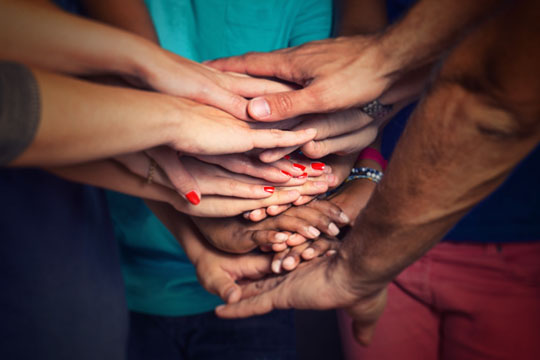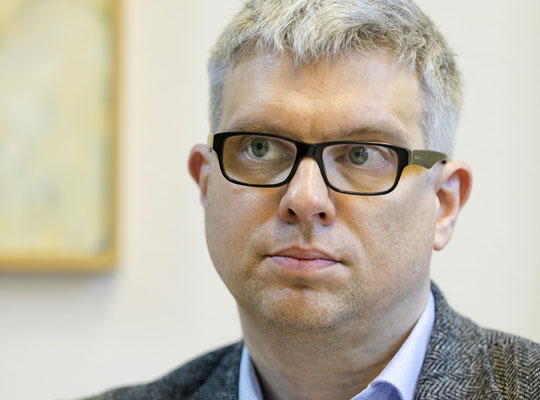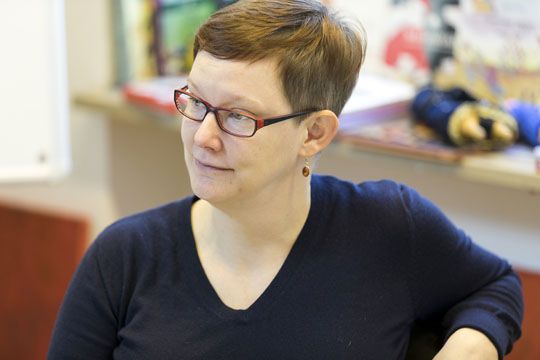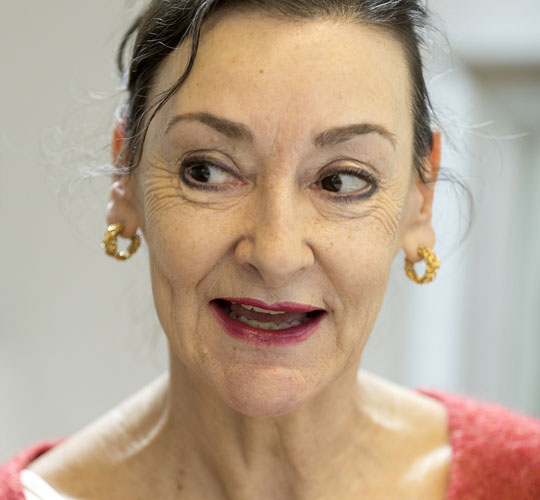“We will not accept racism”
Freiburg, Mar 26, 2018
In January 2018 the German parliament passed measures to more effectively combat antisemitism – a response to stereotypes and prejudices against Jews and Israel which are on the increase in this country. What is the situation at the University of Freiburg, particularly at the Orientalisches Seminar? Professor Dr. Gabrielle Oberhänsli-Widmer from Jewish Studies and Professor Dr. Johanna Pink and Professor Dr. Tim Epkenhans from Islamic Studies talk to Nicolas Scherger about the multidisciplinary projects they’re planning so as to take a joint stand against antisemitism.
 Photo: Lassedesignen/Fotolia
Photo: Lassedesignen/Fotolia
Ms. Oberhänsli-Widmer, Ms. Pink, Mr. Epkenhans - have you observed an increase in antisemitic tendencies in society?
Gabrielle Oberhänsli-Widmer: Definitely, and not just here in Germany. It became quite extreme in Switzerland last year - to the extent that the state is now providing funds to protect Jews. So many Jews are leaving France that Israel logged its highest immigration in the past two years from France. That has never been the case before.
Johanna Pink: The debate over Islam in Germany reveals an ambivalent relationship with this issue. On the one hand there is an area of criticism of Islam which takes a pro-Israel line and polemicizes against Muslims, who they say are bringing antisemitism to Germany. On the other hand, some critics of Islam use the issue to make racist statements socially acceptable on the principle that “I’m allowed to say this sort of thing.” This is increasingly expressed in hate speech against Jews and Israel - for instance, in conspiracy theories focusing on “wealthy Jews.” That is certainly on the increase.
Where are these voices coming from?
Johanna Pink: On the one hand - very clearly from the extreme right. And on the other hand, there is Muslim antisemitism - not among all Germany’s Muslim communities, but it is certainly present in a segment.
Tim Epkenhans: Many people with a migrant background come from authoritarian states in which anti-Zionism - criticism of the state of Israel and the occupation of Palestinian territories - may well often be separated from antisemitism; but ultimately, many of these regimes in the Mideast use clearly antisemitic imagery to legitimize their actions. Many migrants bring this conditioning with them, and a learning process has to take place with the result that it is not acceptable in our context.
Johanna Pink: For instance, it is common to deny the Holocaust - as a Zionist invention to legitimize Israel and to make victims of the Jews. This story is even propagated in schools by governments in the Mideast. Now people from countries like this are arriving in Germany, a society which strongly defines itself via its Third Reich history and where it is considered incitement to cast doubt on the Holocaust. These two things collide, and so it is important to work to counter the problem with education. But much more alarming in my view is that we are also hearing antisemitic statements from the core of civil society.
Gabrielle Oberhänsli-Widmer: Alongside the Neonazis there is also criticism of Israel from the left. And the assumption that antisemitism truly disappeared in 1945 is nonsense from a psychological point of view. With the Shoah - the Nazis’ genocide against the Jews - a great deal of guilt was loaded onto Germany. After the war, Germany did a great deal to compensate for its actions. But that does not automatically lead to a better relationship with Judaism. In media studies there is a model called the spiral of silence; as long as one has the feeling one is in a minority and there is a taboo, one says nothing. You don’t want to make yourself unpopular. But as soon as it is broken, more and more voices are heard, and then that kind of antisemitic statement is back. And social media plays a role, because there you can express your opinions without any filters. That breaks down inhibitions and stirs up a toxic brew.
 Many Mideast regimes use clearly antisemitic imagery to legitimize their actions, says Tim Epkenhans.
Many Mideast regimes use clearly antisemitic imagery to legitimize their actions, says Tim Epkenhans.
Photo: Jürgen Gocke
What role does the faltering Middle East peace process play?
Tim Epkenhans: That does play a role, but the classic Mideast conflict - the central strife between Israel on one side, and its neighbors and the Palestinians on the other - has taken a back seat to things like the rise of the “Islamic State” and the Arab Spring. To some extent alliances are being forged which seem strange from a historical perspective - such as the USA, Israel, and Saudi Arabia against Iran and the Syrian regime. At the same time the cheap propaganda machine is running - for instance, when US President Donald Trump announces he’s moving the US embassy to Jerusalem, thereby recognizing Jerusalem as the capital of Israel, political leaders in the Muslim world exploit that for their own domestic political ends – as the Turkish President Recep Tayyip Erdogan does; one of his aims is to influence migrants in Germany of Turkish descent.
Johanna Pink: That may also explain why this issue carries so much symbolic weight. Whatever you think of Israel’s settlement policy - among Muslims who have nothing directly to do with the conflict, you find identification with the Palestinians to a degree which is far greater than that with other persecuted Muslim groups. This symbolic value is assigned to the issue by authoritarian regimes and religious movements, and of course it is to their benefit that the Mideast conflict is not moving forward. If there were a peace process with contained progress on both sides it would be more difficult to maintain that image of the enemy. But since no-one knows what the solution is meant to look like, and in the perception of each side the other side is continuing with its violence, the conspiracy mentality is boosted.
Gabrielle Oberhänsli-Widmer: What makes me uneasy are the “small” players. In 2017 we had a seminar on the Israeli writer and peace activist David Grossman, who is considered left-wing in Israel. He talks to the Palestinians, travels to the West Bank, visits kindergartens and schools. The textbooks there are a big problem, because they are the first source of information for the young people. Later on it is hard to make any headway against the conspiracy theories about the “evil Jews who control world finance and the media.” David Grossman calls these kids “sweet little ticking time bombs” – because they are indoctrinated.
 Antisemitic provocation also occurs at the University of Freiburg – but the vast majority of students rejects such provocation, says Johanna Pink.
Antisemitic provocation also occurs at the University of Freiburg – but the vast majority of students rejects such provocation, says Johanna Pink.
Photo: Jürgen Gocke
Has the antisemitism issue arrived at the University of Freiburg?
Gabrielle Oberhänsli-Widmer: Of course it is something we discuss in class, for instance in my seminars on contemporary Israeli literature.
Tim Epkenhans: The university is a reflection of society, and students come to the courses and seminars with various viewpoints. If we look back at the big socio-political debates of the past 15, 20 years, this “I’m allowed to say this sort of thing” attitude has arrived in the intellectual sphere – and therefore at the universities too. We have to find answers to it.
Johanna Pink: We can’t do anything about individuals - for example, when people with Salafist or other problematic ideologies come to university and have no interest in working critically through the issues, preferring to spread their preconceived ideas. Provocations like that happen now and again, but the vast majority of students see themselves very differently from such people. But it is our job to ensure that our students have a space in which they can work as openly and critically as they like.
What joint contribution can Islamic and Jewish Studies make?
Gabrielle Oberhänsli-Widmer: As an institute, we have the important task of getting to know one another. Here at the university there are Jews, Muslims, and Christians, and we have to be mindful of that. That’s why we want to work together, and it is good that our student groups are doing a lot to further that end. For instance, there have been joint events at which students watched Israeli and Palestinian films. They also proposed that we offer joint classes in Jewish and Islamic Studies. And we will realize that in winter semester 2018-19 - perhaps with a seminar or series of lectures.
Tim Epkenhans: We’ll decide on the format in spring, start planning and include student representatives, so that we can find out what the students’ expectations of such classes are. We are lucky to have two very active student representative groups which get along well with each other and work closely together. When it comes to not surrendering the public sphere to hatred, they are important multiplicators who can have an effect across the university. We see a clear consensus in all areas of the university: We will not accept racism
 One important task for Jewish Studies is to show the richness of Jewish culture and its influence on Islam and Christianity, says Gabrielle Oberhänsli-Widmer.
One important task for Jewish Studies is to show the richness of Jewish culture and its influence on Islam and Christianity, says Gabrielle Oberhänsli-Widmer.
Photo: Jürgen Gocke
What topics will the classes cover?
Gabrielle Oberhänsli-Widmer: Since 1945, Judaism has been talked about in terms of the Shoah; it is always a story of persecution and destruction. That is one of the tasks of History as a subject; but we in Jewish Studies aim to show something different - the richness of the culture, its influence on Islam and Christianity. One simple example - on Sundays we have one day in the week free. That comes from the Sabbath. Judaism, Christianity, and Islam all have a similar approach in their interpretation of the Holy Scriptures - whether the Talmud, the Bible, or the Koran. These commonalities are a good place to start. I think we have forgotten that Jews and Muslims lived well together until 1948, that it was the foundation of the state of Israel which led to the great break-up.
Tim Epkenhans: Coexistence of the religions in the Mideast was not always full of conflict - quite the opposite. Interaction and mixing over centuries had a key role in the development of the region’s high culture. That is something we underscore.
Are there any further-reaching plans for the medium term?
Gabrielle Oberhänsli-Widmer: We are planning a Master’s degree program on monotheist religions - a collaboration of Islamic Studies, Catholic Theology, and Jewish Studies. That would make sense in the long term, because I always wonder who is going to teach Islam and Judaism one day in the schools.
Johanna Pink: The migration society in Germany has not yet reached that stage. The knowledge about non-Christian religions that is passed on in confessional religious education is superficial at best, and often portrays them as exotic, along the lines of: “As you can see, it’s all a bit strange.” When school pupils express a desire to find out more about Islam, their teachers frequently lack sufficient knowledge. On top of that, Germany has a high proportion of people with no confession, who usually do not even take part in religious education. It is of course much easier to hold antisemitic stereotypes and conspiracy theories if you have never been in contact with any Jewish people and have never learned anything realistic about them.
Gabrielle Oberhänsli-Widmer: Our Master’s degree will aim to counter this problem. We plan to train religious studies experts who can work in schools - where children get their first information about religions. And now a word from my Helvetic patriotism: Switzerland has long had “Ethics and Religion” as a school subject, in which religious studies are taught neutrally. In line with this, the subject has existed at universities for a long time.
It is certainly a good idea to start with schools so that children don’t develop stereotypes - but can you still influence those who already have antisemitic tendencies?
Johanna Pink: You are unlikely to get through to those whose world view is unchanging - on the extremes of the right and the left, as well as Muslim ideologues - because they dismiss the Holocaust and every historical argument as an invention of the “Zionist press.” Then again there a many who have vague stereotypes they have never thought through, perhaps because they grew up in an environment in which no-one ever questioned these prejudices. At Studium Generale events for instance about criticizing Islam, we observe that many people come, follow the current debate, and often have diffuse worries and fears. At the same time they are open and want to find out more. The feedback we get from these people is: “Well that was interesting, that has got me thinking and has opened up a new perspective for me.” That really is possible with a large proportion of the population.
Is it also a generational question, how people approach the issue of antisemitism - especially here in Germany and with ever more time between us now and National Socialism?
Gabrielle Oberhänsli-Widmer: When I first started at the University of Freiburg 14 years ago, the students were still very strongly motivated by the Shoah theme. Later, it was primarily the Mideast conflict which aroused the students’ interest. Fortunately I rarely see that German students still feel guilt for the crimes of the Nazis. Young Israelis are very open towards young Germans and vice versa, there is no longer any enmity.
Johanna Pink: My grandparents experienced the Third Reich as adults, and my generation experienced the consequences of World War II directly in the form of the division of Germany. But all that is long ago for today’s students. For them, it’s a part of German history, as Otto von Bismarck was for our generation - you learn about it, but it is no longer personal. But in Germany of all places this issue must be present in education. In places like Austria and East Germany the confrontation with historical responsibility was not nearly as comprehensive. Even today the knowledge of what happened is scarce, and resentments are far greater. But in Germany, relatively broad layers are aware of the issues. It is important for it to stay that way.

